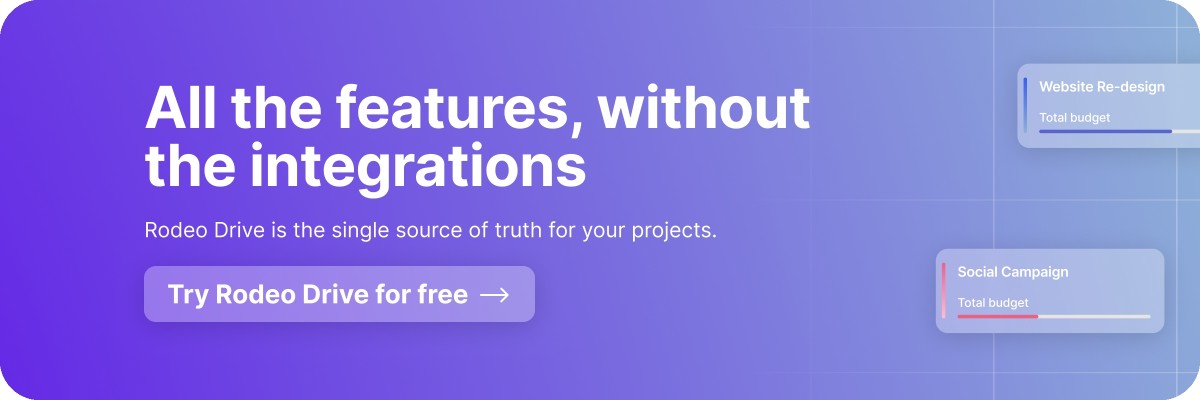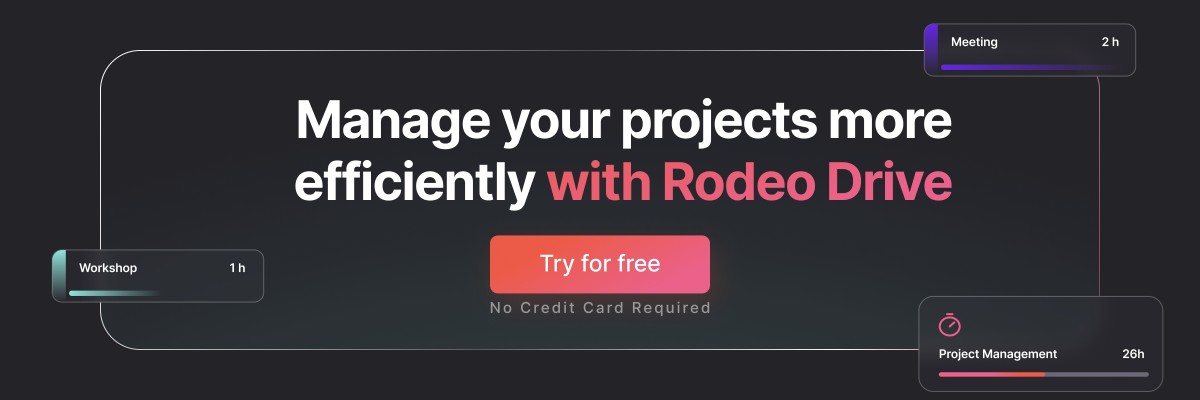Mastering Digital Marketing Project Management: The Ultimate Guide
Project management is a crucial aspect of any successful digital marketing campaign.
As a digital marketing project manager, your day involves coordinating resources, setting goals, and tracking progress to ensure that projects are delivered on time and within budget.
With the fast-paced and ever-evolving digital landscape, having a solid understanding of project management is more critical than ever for digital marketing professionals.
Sounds like a lot, right? Don’t worry; in this article, we dive into the basics of project management for digital marketing and share tips and best practices to help you stay organized and on track.
What is project management in digital marketing?
Digital marketing project management helps teams properly organize, plan, and execute projects and deliver on the objectives within budget and to the required quality.
Planning for marketing projects can be a significant undertaking. It involves defining project goals and objectives, developing a project plan, allocating resources, monitoring progress, and making adjustments to ensure successful project delivery.
Because projects are temporary and have a looming deadline, project management in digital marketing is essential for ensuring that campaigns are executed effectively, resources are utilized efficiently, and results are consistent and measurable.
Simply following the project lifecycle wouldn’t cut it. The digital marketing project manager oversees the entire project lifecycle while dealing with high expectations, deadlines, and disruptions.
Before kick-off, team members need crucial information like scope, deliverables, and project timelines.

A digital marketing project manager's day-to-day tasks include the following:
-
Defining project scope, goals, and objectives in collaboration with stakeholders
-
Developing a project plan, including task assignments, deadlines, and budget estimates in a visualization that’s accessible and easy to understand
-
Allocating resources, including personnel and technology, to ensure project success
-
Monitoring project progress and adjusting as needed to keep projects on track
-
Communicating project status to stakeholders and ensuring project deliverables meet quality standards
-
Managing risks and issues and ensuring that solutions are implemented to address them
-
Ensuring that project objectives are achieved and that the project is delivered on time, within budget, and to the required quality.
Some of these tasks overlap with marketing project management, but the focus might be different. Digital marketing projects can include topics like web performance, social media, and content marketing.
Related: The Ultimate Guide for Creative Project Management in 2023
The importance (and challenges) of project management in digital marketing
Without proper project management, it’s easy for digital marketing teams to lose focus or miss important information while working on deliverables.
According to PMI 2020 Pulse of the Profession® Report, organizations that undervalue project management see an average of 67% of their projects outright fail compared to organizations with proper project management procedures in place.
A dedicated and skilled project manager will ensure goals are being set and team members are held accountable for meeting them. Such goals include setting up email marketing campaigns or increasing revenue for a client by applying an affiliate marketing strategy.
These projects also require a team with various skills working together for success. Digital marketing project management helps them do so by defining tasks and responsibilities.
Of course, the challenges your team will face might largely depend on the area of digital marketing you work in. Here’s an overview of the various areas of digital marketing:
PPC
Simply put, pay-per-click (PPC) advertising is a type of online advertising where the advertiser pays each time a user clicks on one of their ads. Research by PPC Hero claims that 79% of brands find PPC a huge business driver.
PPC requires a lot of expertise. Successful PPC advertising requires combining technical, creative, and analytical skills like keyword research, ad creation, optimization, and reporting.
Advertising with a PPC strategy can be expensive, especially for highly competitive keywords. Advertisers need to manage their budgets to ensure they spend appropriately. Plus, they need to understand their target market and use the right keywords and demographics to reach them.
It can be challenging to accurately measure a PPC campaign's success and determine the ROI of each ad without having done the research before the campaign.
Overseeing all these moving parts and delivering successful campaigns can be challenging. A project manager who can create a diligent workflow beforehand can help each ad run successfully.
Social media marketing
Almost 92% of U.S. marketers working at companies larger than 100 people used social media marketing in 2022. As you can see from this number, social media marketing is an essential part of digital marketing.
Social posts might look fun to create, although there is usually a well-researched strategy behind them. To create a successful social media campaign, you need a few key ingredients: creativity and organization.
There is a lot of pressure on social media marketers to deliver campaigns that “go viral.” Stakeholder management is all about communication and managing expectations and must be implemented before the scope is defined.
Project management plays a huge role in ensuring all aspects of a social media marketing campaign are executed, such as engaging with comments and replying to DMs.
SEO
Since 68% of online experiences begin with a search engine, search engine optimization (SEO) is essential to have an online presence. SEO gives your website the potential to rank higher in search engines like Google, resulting in more visits from (potential) customers.
Companies can use various SEO strategies to show up near the top of the search results. Smaller companies or startups may collaborate with an agency specializing in SEO. A project manager facilitating effective communication between the two parties is essential to successfully delivering SEO projects.
Content marketing
Content marketing involves creating and distributing valuable, relevant, and consistent content to educate, entertain and engage the target audience to build trust and brand loyalty.
While social media marketing is content, content marketing focuses on different types of content, such as blog posts, videos, podcasts, and infographics.
Content marketing is a staple for most marketers, and rightly so. Digital selling drives content strategists and creators. Over the pandemic, the usage of content increased by 207%.
Content creation, publishing schedules, stakeholder management: content marketing is a lot of work. A content marketing project manager keeping an overview of all the moving parts helps teams stay focused on their tasks.

Email marketing
Email marketing has been around for many years but has seen a surge during the last few years. This form of direct marketing involves sending emails to a target audience to promote a product, service, or brand while building customer relationships and increasing brand awareness.
The future of email marketing is bright. Dedicating more resources could benefit a company’s overall growth. According to Statista, email marketing revenue is estimated to reach almost $11 billion by the end of 2023.
Clients can have the potential to invest a lot in email marketing. A project manager specializing in email marketing supports the team by tracking budgets and campaigns, helps people to stick to deadlines, and compiles reports for stakeholders.
Mobile (SMS) marketing
SMS (short message service) marketing uses texts to build customer relationships and aims to drive leads and interest in products and services. Email and SMS marketing are pretty similar. While you might want to add a longer copy in an email, with SMS, you must get to the point fast while still trying to sell, educate, or build loyalty.
With the rise of social media platforms and other texting services like WhatsApp, some marketers see email marketing as a dying art. And with the mobile marketing market size forecasted to reach $57.85 billion by 2030, mobile marketing is a channel worth investing in.
The planning and structuring of these attention-grabbing messages require constant attention to detail as there are fairly strict rules regarding mobile marketing. You could face legal issues if a prospect or customer doesn’t give permission before sending an SMS.
Plus, it doesn’t benefit the brand image – texting without consent is spammy.
Starting a mobile marketing campaign can be lengthy as you will need to build a list of phone numbers, including corresponding opt-in consent. A digital marketing project manager can hold marketers accountable and be on top of all the steps that must be taken before sending out a text message blast.
Affiliate and Influencer Marketing
As a brand, you’ll need promotion for the products or services you sell. An affiliate or influencer marketing strategy is based on teaming up with an external publisher.
The influencer promotes the brand to their followers through social media, blogs, or other online platforms. The goal is to reach a larger audience and create a more authentic and trustworthy connection between the brand and its potential customers.
This strategy is usually a win-win. The brand gets a sale, and the influencer receives a commission.
It’s good business. The global influencer marketing market was valued at $16.4 billion in 2022, having more than doubled since 2019.
An affiliate and influencer strategy is very scalable but needs a lot of coordination and communication. Companies can have strict rules on commissions and how to promote the product or service. A dedicated team member or project manager who is on top of all the details and contracts is vital.
What does a successful digital marketing project management process look like?
Digital marketing teams have tons of responsibilities in ensuring projects run smoothly and deliverables are met.
Feeling overwhelmed? The digital marketing project management process is the backbone of the project and helps you to check all the boxes and typically involves the following 5 stages:
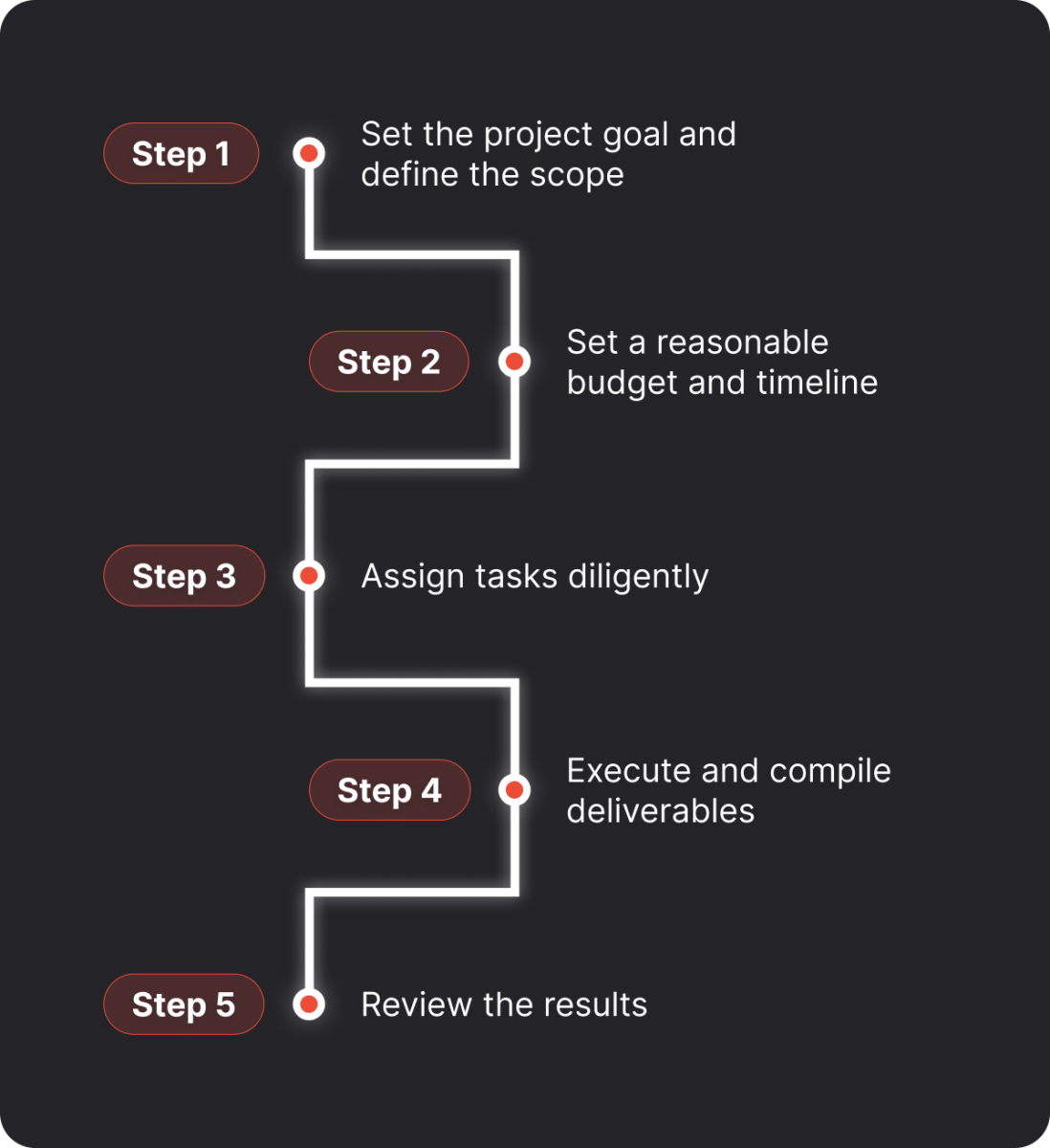
1. Set the project goal and define the scope
There are several stages before your project shifts into production mode. This initial phase involves identifying the overall goal or KPIs and defining the project scope and plan.
The project goal is the desired outcome of a project and is very high-level. It’s crucial to outline the project objectives as this will impact the overall course of the project.
The project scope statement will help clients understand the project’s boundaries and the required work throughout the entire project’s lifecycle. Include how the progress is tracked and how updates are communicated.
2. Set a reasonable budget and timeline
The project budget outlines the required funds to complete the project. When presenting the budget and timeline, the goal is to win stakeholder approval to move forward with the necessary budget.
Your project budget will include several categories of costs. Which ones will vary depending on the project. A digital marketing campaign might not include any material costs, for example. Think about adding these categories to your budget:
-
Labor costs: This includes salaries, healthcare benefits, and (payroll) taxes. Digital marketing agencies adopt a time-based approach to billing clients.
-
Transportation costs: This applies to any travel that’s necessary to complete the project.
-
Professional service costs: Expenses incurred from consultancies or other third parties.
Your project timeline is vital to keeping your project on track. Make this visually appealing and accessible to everyone can see where the project stands. An advantage of having a project timeline for the internal team is that it shows the chronological order in which each task needs to be completed. The stakeholders will appreciate the full transparency.
Tip: Time blocking is a great way to optimize productivity. Read our Guide to Mastering Time Blocking to make the most out of your team’s valuable working hours.
3. Assign tasks diligently
Project management in digital marketing is key to facilitating team collaboration and optimizing productivity.
An effective project plan includes assembling a team with the necessary skills and availability to meet project objectives. Project managers can boost team success and efficiency by assigning tasks that match team members' expertise.
Workload management also impacts project outcomes, as being able to allocate tasks based on availability enhances project management. The digital marketing project manager can facilitate team collaboration by mediating timelines, resolving conflicts, and communicating with the client, freeing up team members to concentrate on their work and increase productivity.
Also read: The 26 Key Project Management Skills for Success

4. Execute and compile deliverables
Now that team members have the information required for their tasks, it’s time to roll up the sleeves.
After executing the deliverables, you can start preparing to present your work to the client. This stage might repeat if you work with project phases or a short campaign turnaround time.
Regardless of what this stage looks like for your digital marketing team, it’s an important one. This is the time to address feedback and adjust the deliverables accordingly before launching a campaign.
5. Review the results
You can never tell what the exact outcome of a marketing campaign will be. By reviewing the campaign results and comparing them with the goal you’ve set up in the first stage, you’ll be able to measure the performance.
At this last stage, reserve time to review the completed digital marketing project management process with the team and be open to feedback.
Tips for managing digital marketing projects
These digital marketing project management stages can help you establish the foundation of the workflow.
To ensure the best possible outcome for your project, we’ve compiled best practices.
Tip #1: Host an internal kickoff meeting
If you are coordinating a digital marketing team in-house, you will have a good understanding of the company culture and how meetings are usually done. In order for the project to run as streamlined as possible, it’s essential that every team member is fully briefed and aware of their tasks, the goal, and the timeline.
Going through the allocated tasks per division or team member will bring structure to the initial phases of the digital marketing project.
This process can feel tedious, especially for large digital marketing teams who can’t wait to start strategizing and producing top-notch content, but ensuring everyone knows what’s coming is key and will avoid many questions during the next project stages.
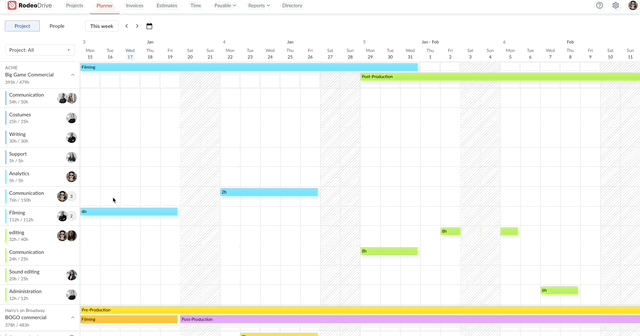
Using Rodeo Drive, you can plan ahead and view the progress thanks to our timeline view.
Also read: The Project Management Checklist: 12 Steps to Follow
Tip #2: Prepare for obstacles
The complete digital marketing project lifecycle is set, and the team is off to the races. As a digital marketing project manager, you might have to deal with high expectations, a tight budget, and perhaps an even tighter schedule.
Life is like a box of chocolates, and project management is no different. Digital marketing projects don’t often go according to plan. Creating an outline of the biggest threats to the project’s deadline and deliverable and how you will mitigate those risks will make you feel prepared for when things have to shift.
Consider how both internal and external risks could impact the digital marketing project. Employee turnover could lead to less production and potentially create danger for the looming deadlines as you will need to invest time to brief new staff.
Changes in the budget could influence the team dramatically. Ideally, you want to visualize the budget and how it’s allocated.

Digital marketing project management software tools like Rodeo Drive offer budgeting features to speed up this process and allow you to break down your budget into phases, activities, and tasks. If anything needs to shift, you see the effect on the production instantly.
Related: How to Create a Winning Marketing Project Plan
Tip #3: Facilitate clear project updates
Good communication is instrumental for a successful project. Ensure your updates are clear and consistent.
When it comes to communicating project updates internally and externally, everyone might have a different preference, which can cause some messages to get lost in the mix. Use a project communication plan that outlines how and when communication should occur.
A stakeholder could disturb the progress by wanting updates on every ad or produced piece of content. By creating a document outlining the communication channels and schedule, all parties will be aligned on when and where updates on the project’s progress.
A project management software tool will have built-in real-time reporting features that will make it easier to monitor project progress and create updates.
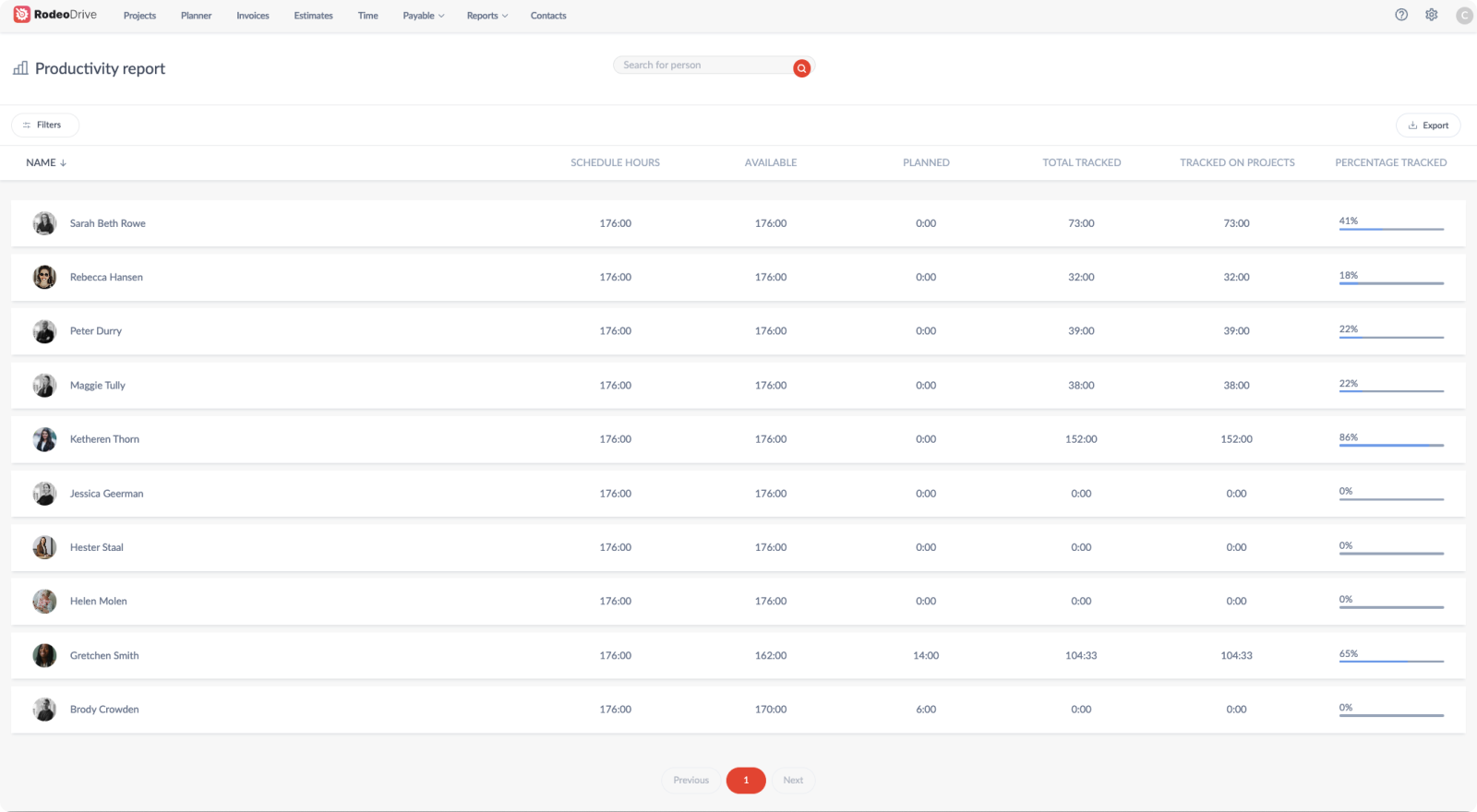
Rodeo Drive’s reports will show you employee productivity, how many hours the team has tracked, and if the project is close to completion. An export of the report with a short statement or update will calm everyone down.
Tip #4: Learn from past projects
If this isn’t your first Rodeo (wink), think about similar projects in the past. Analyze what worked and didn’t and base your timeline on your learnings.
If this is your first time wearing a digital marketing project manager’s hat, assess your success when the project comes to an end.
You can measure success in various ways. Look at the timeline and if it shifted over time, what impacted the budget, and if the deliverables were high quality and praised.
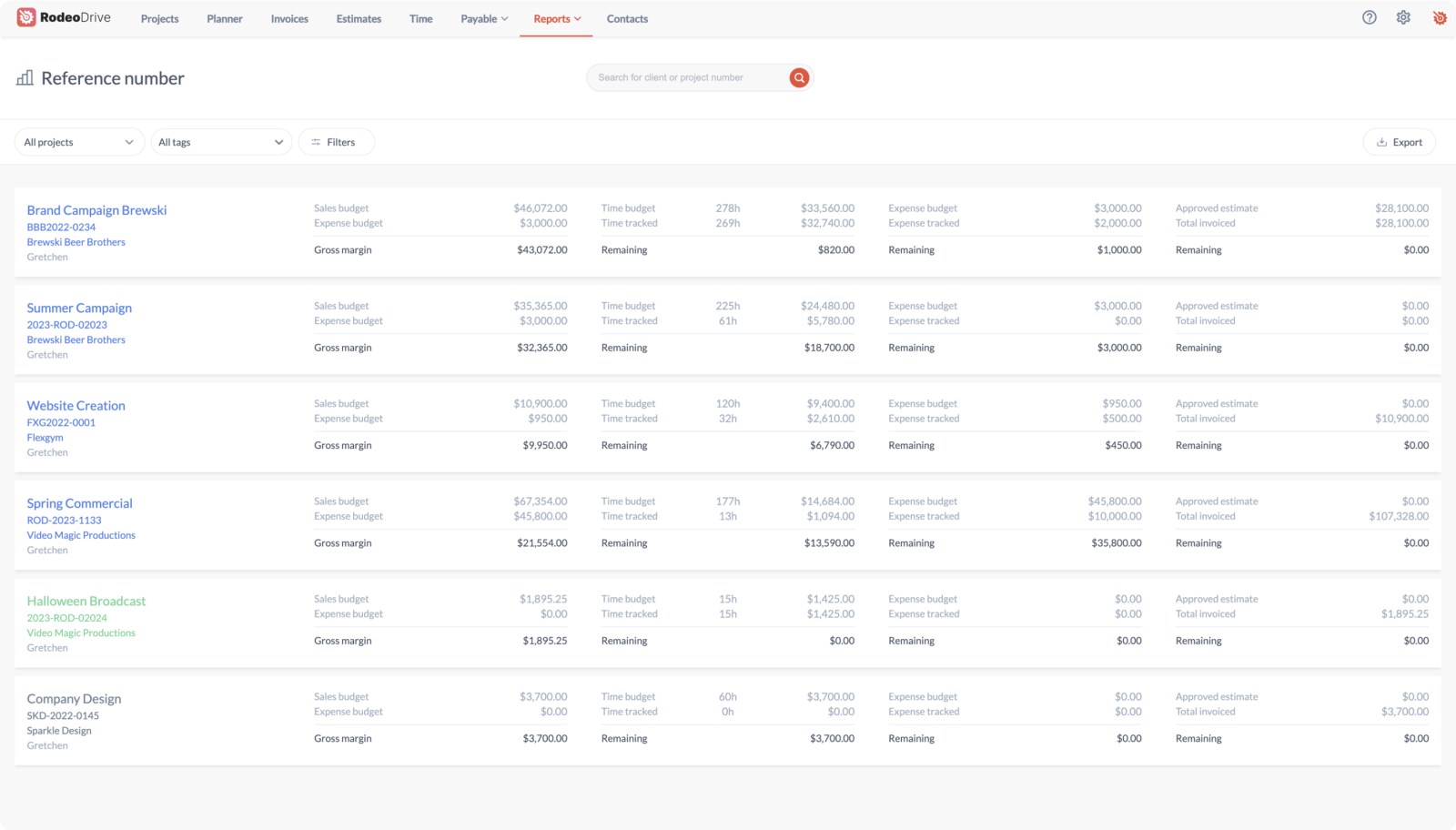
Reports on your closed projects help you also understand the profit margin and if the outcome contributed to the financial success of your company.
Tip #5: Use a digital marketing project software
Utilizing marketing project management software will save you time while working on digital marketing projects. Assess your team's needs and processes before choosing a digital marketing project management software.
Not everyone is tech-savvy, and you might need to onboard freelancers or new staff while the project runs.
Rodeo Drive is an intuitive project management tool that makes it easy to manage your digital marketing projects at every stage because all features are interconnected.
All projects in Rodeo Drive start with a detailed project budget. Your budget will update in real-time as you record hours worked.
You can export your budget as an estimate ready for client approval, and invoice clients via Quickbooks (US) or Xero (UK).
Check on the project progress via Rodeo Drive’s automatically generated reports at any stage.
Takeaway
Well, there you have it. We hope we’ve successfully guided you through all the stages of project management in digital marketing.
To make your life easier, we suggest looking for an all-in-one project management solution to serve as a single source of truth for your projects.
With Rodeo Drive, you’ll be able to spend more time doing what you do best — creating digital marketing campaigns and strategies. Elevate your digital marketing processes with a free Rodeo Drive account today.





